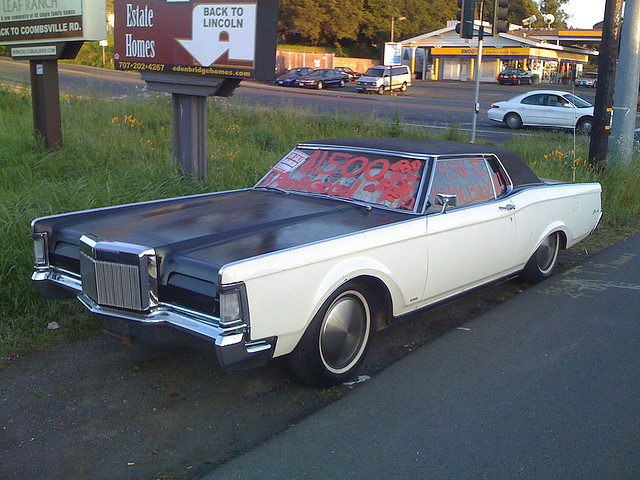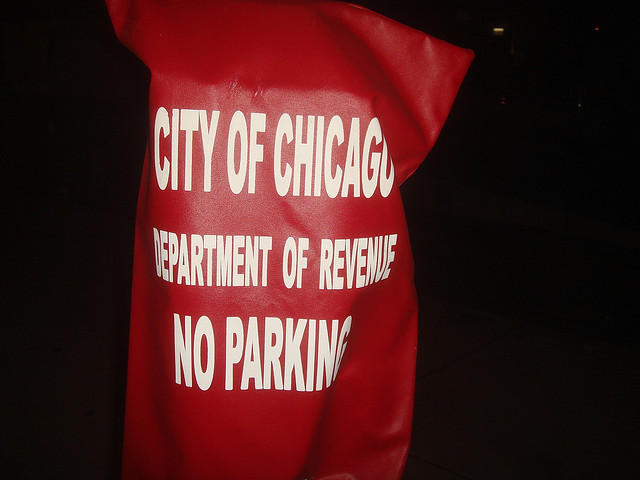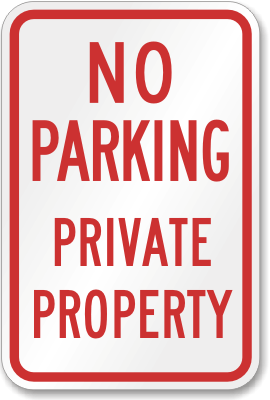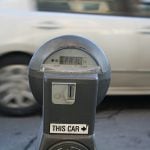Private parking meters: lessons from Chicago

If someone offers you $2,000 to get this car out of your parking lot, should you take it? From Flickr’s tastybit, licensed under Creative Commons.
You’ve been driving your hooptie for years. It’s an ’85 Buick, rusted and broken-down; it guzzles gas, needs constant maintenance, and everyone who gets in the passenger seat whines about the indignity. You’d probably have to pay a teenager to take it off your hands.
One day, a friendly stranger wearing an Italian suit and carrying a shiny leather briefcase knocks on the door and offers to buy your beater for two thousand bucks, as-is, no questions asked. You might say no and start checking under the trunk panels for hidden stashes of money, right?
This is the situation many American cities’ parking systems find themselves in – except they tend to skip the part where they reconsider the sell-off, and ask themselves whether they could be doing a better job.
In 2008, Chicago leased its parking system to Morgan Stanley and a few other investors operating under the name of Chicago Parking Meters LLC, two years after unloading its parking garages to Morgan Stanley alone; New York has been looking at similar deals, though the mayor’s office has been falling all over itself to point out the differences between the arrangement it’s looking at and Chicago’s.

Chicago’s missing out on around $5 billion in parking revenues but sold its parking for a paltry $1 billion and change, says Matt Taibbi. Creative Commons-licensed; via danxoneil.
Chicago is looked at by most observers as an unmitigated catastrophe, for many reasons – the city lost the ability to reverse the usual parking rules for public events or for any other reason, and projections indicate that Chicago will end up paying back the investors who bought the meters the $1.1 billion they got, in the form of fees levied for exceptions or for more generous parking hours. Worse, the price-setting latitude the lease granted the investors who took over the meters might have been a bit generous; parking in the city is the most expensive in America, and Chicagoans aren’t getting any of that money.
Today, Cincinnati is looking at a privatization deal, too. It’s humbler – $92 million, and parking meters will be taken care of by Xerox, a parking company and the city’s own Port Authority. Some news sources think this may not be the worst idea – but what can we learn from Chicago’s experience?
Privatization can be more palatable to voters than higher rates at the meter – even when those rates are justified.
People see parking as a public good, but it’s way underpriced pretty much everywhere in America; privatization can be a way to cut through the democratic process in cases of interminable and counterproductive gridlock. Let’s face it – even when the traffic prevention and environmental benefits outweigh the costs, higher parking rates are a tough sell. But even if Chicago’s Mayor Daley was being given dubious advice, generations of Chicago aldermen had refused to substantially raise rates for 20 decades.
On the other hand, privatization cuts through the democratic process whether or not the gridlock might have other solutions. Voters in Chicago didn’t throw out their aldermen in the next election, but they did throw out Mayor Daley, who they saw as the architect of the deal.
Know what you’re selling.
Some digging by Rolling Stone journalist Matt Taibbi revealed that Mayor Daley’s office hadn’t accurately measured the revenues parking brought in – at best, they’d looked at how much they were actually collecting when thinking about their selling price, rather than anything approximating parking’s efficient price. (According to Taibbi, the market value of Chicago’s parking over the course of the 75-year lease it sold is closer to $5 billion than $1.1 billion.)
Plenty of third-party consultants can calculate the value of a parking system in terms more accurate than the numbers you might get by asking traffic court receipts or the folks who go around collecting change from meters.
So if your hooptie is worth $500, don’t sell it for $200. At least get it appraised.

Chicago has lost the right to dictate the terms of its own parking – is it worthwhile for other cities to do the same in exchange for cash? From Myparkingsign.com.
Don’t allow the lessor to expropriate the income.
Cincy is clearly paying a little more attention to where the money is going than Mayor Daley’s office was in 2006 or 2008. Its plan includes a much-needed interchange that would improve accessibility of some underserved neighborhoods, certainly a boon to businesses, and it would create a new residential tower, as well as a grocery store, which would lead (indirectly) to taxable income.
At the same time, half of the receipts from the lease would go for closing up short-term budgetary gaps. Cincinnati’s 30-year lease is better than Chicago’s 75-year lease, but both are still a long time to be in hock in order to solve a single mayor’s short-term budgetary problems. We can only hope that profits from the sale stay in the U.S. – notoriously, cash from Chicago’s parking meters goes to Denmark, Sweden and Abu Dhabi. Which leads to the most terrifying part of any deal like this…
If the terms of the lease are longer than your elected official’s term, there’s a stronger possibility you’re being screwed.
When Rahm Emanuel took office, one of the first things he did was look into loopholes enabling Chicago to get out of its 75-year lease. Every time an alderman negotiated to cut down on tolled parking hours outside of the terms of the lease, the city ended up with a bill – and these added up to millions per year. So Mayor Daley saddled dozens of mayoral terms with oppressive payments to the holding company leasing the meters.
What do you think of privatizing parking? Is it ever worthwhile? Was there another way for Chicago to solve its budget woes – and how about Cincinnati?
-C. Lumm
Related articles
Related Posts
Category: No Parking
























